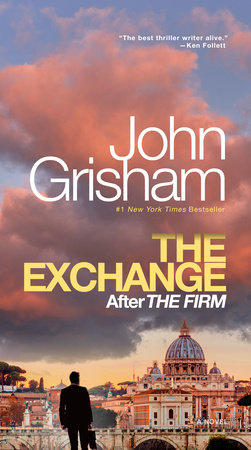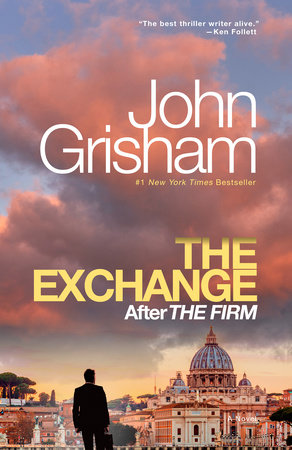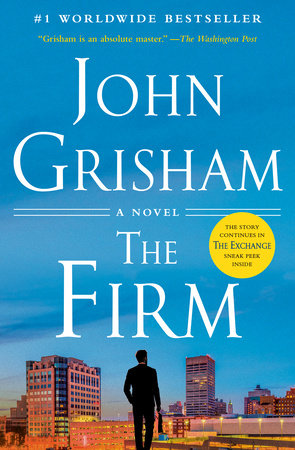Excerpt
The Exchange
Chapter 1
On the forty-eighth floor of a glistening tower on the southern tip of Manhattan, Mitch McDeere stood alone in his office and gazed out the window at Battery Park and the busy waters beyond. Boats of all shapes and sizes crisscrossed the harbor. Massive cargo ships laden with containers waited almost motionless. The Staten Island Ferry inched past Ellis Island. A cruise ship packed with tourists headed out to sea. A mega yacht was making a splendid entrance into the city. A brave soul in a fifteen-foot catamaran zigzagged about, dodging everything. A thousand feet above the water no fewer than five helicopters buzzed about like angry hornets. In the far distance, trucks on the Verrazano Bridge stood still, bumper to bumper. Lady Liberty watched it all from her majestic perch. It was a spectacular view that he tried to appreciate at least once each day. Occasionally he succeeded, but most days were too hectic to allow time for such loafing. He was on the clock, his life was ruled by it, just like the hundreds of other lawyers in the building. Scully & Pershing had over two thousand scattered around the world and vainly considered itself to be the premier international firm on the planet. Its New York partners, and Mitch was one, rewarded themselves with larger offices in the heart of the financial district. The firm was now a hundred years old and reeked of prestige, power, and money.
He glanced at his watch and the sightseeing came to an end. A pair of associates knocked and entered for another meeting. They met around a small table as a secretary offered coffee. They declined and she left. Their client was a Finnish shipping company having problems in South Africa. The authorities there had embargoed a freighter packed with electronics from Taiwan. Empty, the ship was worth about a hundred million. Fully loaded, it was worth twice that, and the South Africans were upset over some tariff issues. Mitch had been to Capetown twice in the past year and was not keen to return. After half an hour, he dismissed the associates with a list of instructions, and welcomed another pair.
At 5 p.m. sharp he checked in with his secretary, who was leaving, and walked past the elevators to the stairs. For short rides up and down he avoided the elevators to escape the mindless chitchat of lawyers he knew and didn’t know. He had many friends in the firm, and only a handful of known enemies, and there was always a new wave of fresh associates and eager junior partners with faces and names he was supposed to recognize. Often he did not, nor did he have time to pore over the firm directory and try to memorize them. So many would be gone before he knew their names.
Taking the stairs worked his legs and lungs and always reminded him that he was no longer in college, no longer playing football and intramural basketball and able to do so for hours. He was forty-one and still in decent shape because he watched his diet and skipped lunch at least three times a week while he worked out in the firm’s gym. Another perk for partners only.
He left the stairwell on the forty-second floor and hustled to the office of Willie Backstrom, another partner, but one with the luxury of not billing by the hour. Willie had the enviable position of running the firm’s pro bono programs, and though he kept up with his hours he did not send bills. There was no one to pay them. The lawyers at Scully made plenty of money, especially the partners, and the firm was notorious for its commitment to pro bono work. It volunteered for difficult cases around the world. Every lawyer was required to donate at least 10 percent of his time to various causes, all approved by Willie.
There was an even split down the middle of the firm on the issue of pro bono work. Half the lawyers enjoyed it because it was a welcome break from the stressful grind of representing high-pressure corporate clients. For a few hours a month, a lawyer could represent a real person or a struggling nonprofit and not worry about sending bills and getting paid. The other half paid lip service to the lofty notion of giving back but considered it wasteful. Those 250 hours a year could be better spent making money and improving one’s standing with the various committees that determined who got promoted, who made partner, and who eventually got the boot.
Willie Backstrom kept the peace, which wasn’t really that difficult because no lawyer, regardless of his or her ambition, would ever criticize the firm’s aggressive pro bono programs. Scully even gave annual awards to its lawyers who went beyond the call of duty in service to the less fortunate.
Mitch was currently spending four hours a week working with a homeless shelter in the Bronx and representing clients who were fighting evictions. It was safe, clean office work, which was just what he wanted. Seven months earlier he had watched a death row client in Alabama utter his last words before being executed. He’d spent eight hundred hours over six years trying in vain to save the guy, and watching him die was heartbreaking, the ultimate failure.
Mitch wasn’t sure what Willie wanted, but the fact that he’d been called in was an ominous sign.
Willie was the only lawyer at Scully with a ponytail, and a bad one at that. It was gray and matched his beard, and just a few years before someone higher up would have told him to shave and get a haircut. But the firm was working hard to shed its fossilized image as a white-collar club filled with white men in dark suits. One of its radical changes was the ditching of a dress code. Willie grew hair and whiskers and went about his work in jeans.
Mitch, still in a dark suit but with no tie, sat across the desk as they went through the small talk. Willie finally got around to it with “Say, Mitch, there’s a case down south I want you to take a look at.”
“Please don’t tell me the guy is on death row.”
“The guy is on death row.”
“I can’t do it, Willie. Please. I’ve had two of those in the past five years and both got the needle. My track record is not very good.”
“You did great work, Mitch. No one could have saved those two.”
“I can’t take another one.”
“Will you at least listen?”
Mitch conceded and shrugged. Willie’s fondness for death row cases was legendary and few lawyers at Scully could say no to him. “Okay, I’ll listen.”
“His name is Tad Kearny and he’s got ninety days. A month ago he made the strange decision to fire his lawyers, all of them, and he had quite a team.”
“Sounds crazy.”
“Oh, he is. Off-the-charts crazy, probably legally insane, but Tennessee is pushing hard nonetheless. Ten years ago he shot and killed three undercover narcotics officers in a drug bust that went haywire. Bodies everywhere, total of five died at the scene. Tad almost died, but they managed to save him so they could execute him later.”
Mitch laughed in frustration and said, “And I’m supposed to ride in on a white horse and save the guy? Come on, Willie. Give me something to work with.”
“There’s virtually nothing to work with, except insanity. The problem is that he probably won’t agree to see you.”
“Then why bother?”
“Because we have to try, Mitch, and I think you’re our best bet.”
“I’m still listening.”
“Well, he reminds me a lot of you.”
“Gee thanks.”
“No, seriously. He’s white, your age, and from Dane County, Kentucky.”
For a second Mitch couldn’t respond, then managed to say, “Great. We’re probably cousins.”
“I don’t think so, but his father worked in the coal mines, same as yours. And both died there.”
“My family is off-limits.”
“Sorry. You caught a lucky break and had the brains to get out. Tad did not and before long was involved with drugs, both as a user and a dealer. He and some pals were making a big delivery near Memphis when they were ambushed by narcotics officers. Everybody died but Tad. Looks like his luck has finally run out.”
“No question about his guilt?”
“Certainly not for the jury. The issue is not guilt but insanity. The idea is to have him evaluated by some specialists, our doctors, and file a last-minute Hail Mary. First, though, someone has to go in and talk to the man. Right now he’s not accepting visitors.”
“And you think we’ll bond?”
“It’s a long shot, but why not give it a try?”
Mitch took a deep breath and tried to think of another way out. To pass the time he asked, “Who’s got the case?”
“Well, technically, no one. Tad has become quite the jailhouse lawyer and he filed the necessary papers to terminate his attorneys. Amos Patrick represented him for a long time, one of the best down there. You know Amos?”
“I met him once at a conference. Quite the character.”
“Most death row lawyers are real characters.”






